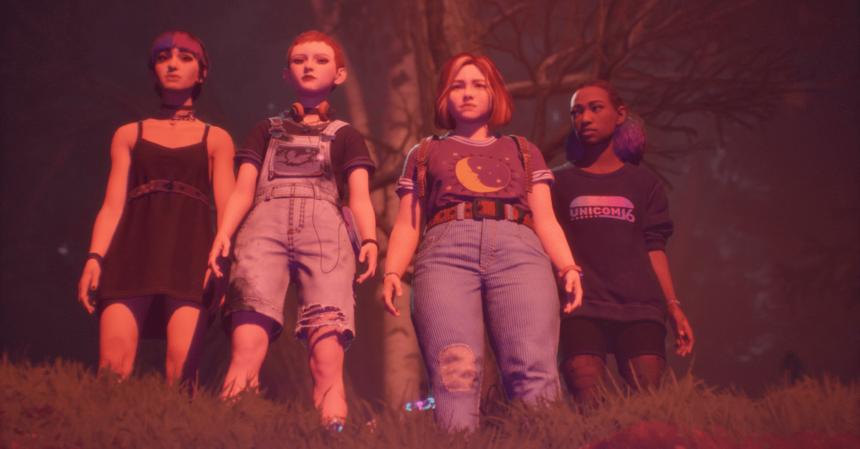Witnessing the trajectory of Life Is Unusual has been nothing wanting outstanding. From its humble beginnings in 2015 to the wealthy tapestry of sequels, spinoffs, and religious successors, DontNod Leisure carved out a particular area of interest within the realm of character-driven video games. Every installment — whether or not crafted by DontNod or Deck 9 — brings a recent dose of Twin Peaks-inspired supernatural intrigue, heartfelt narratives that steadiness between endearing sincerity and occasional cringe, and a celebration of connections amongst queer and ethnic of us on the margins of society.
Nonetheless, the video games have grappled with an identification disaster, with its newest effort from Deck 9 veering away from the indie movie attraction of its predecessors right into a Marvel-esque spectacle that feels disconnected from what initially endeared it to followers. Fortuitously, Misplaced Data: Bloom & Rage not solely recaptures the essence of the unique Life Is Unusual but in addition carves out its personal real, compelling path, standing proudly as a religious successor that elevates the style’s poignant theming and character writing to larger heights and establishes a universe uniquely its personal.
Misplaced Data: Bloom & Rage, developed by DontNod Montréal — a brand new department made up of Life is Unusual alumni — channels the nostalgic vibe of Starz’s Yellowjackets, however trades cannibalism for an additional dose of lesbian witches. The narrative oscillates between two timelines: the summer season of 1995, when 4 teenage women type a punk rock band referred to as Bloom & Rage, and their reunion 27 years later. Gamers step into the sneakers of Swann, a reserved loner who desires of being a filmmaker, capturing her small-town life in Velvet Cove, Michigan, together with her camcorder. After clashing with a bigoted teenage boy, Swann bonds with fellow outcasts Nora, the rebellious punk; Autumn, the nurturing good friend with a “mother” function within the clique; and Kat, the extreme, introverted chief. Now of their 40s, the ladies collect of their hometown bar to uncover long-forgotten supernatural occasions that led them to float aside — and the vow they made by no means to reunite.
What stood out to me was the distinctive character writing and the recent, progressive method to relationship dynamics. Misplaced Data is much less about scrubbing for collectables or examine packing containers — like which of your companions you would possibly wish to smooch whereas erratically switching up your persona like a fake-ass good friend — and extra about letting you doc the little moments you suppose are value remembering.

Picture: Don’t Nod Montréal through gamexplore
Misplaced Data’ writing sidesteps the pitfalls of binary good-versus-bad selections by enriching its dialogue with the nuance that comes from studying to close up, hear, and mull over considerate responses as an alternative of feverishly clicking the primary reactions which can be out there in intimate and informal chats. In some other sport, in the event you held out on deciding on a knee-jerk dialogue response and slicing off one in every of Swann’s mates, that different character would merely path off like ready room music as you deliberated over which binary choices to answer them with. In Misplaced Data, new dialogue prompts will seem the extra Swann’s mates reveal tidbits of safeguarded emotions about their predicaments, be it in 1995 or the current, supplying you with the choice to press additional with extra piercing responses or letting them hold to spare their emotions. Most of the time, I waited out and didn’t robotically select the brand new prompts as they appeared as a result of they didn’t gel with the relationships I’d engendered with Swann’s mates. I used to be mainly embodying the “We hear, we don’t decide” meme, and but, the sense that I used to be really listening to them, quite than steamrolling over their shyly shared insecurities, felt tangible in each interplay.
Misplaced Data tracks who you spend essentially the most time with, dynamically shaping Swann’s closest relationships — whether or not with a finest good friend or a possible romantic companion. Having performed quite a few video games of Life is Unusual’s ilk, I initially discovered myself slipping into the outdated, Pavlovian mindset of eager to “remedy” the sport, treating dialogue selections and environmental puzzles like formulaic duties to reach on the “right solutions.” Nonetheless, Misplaced Data shatters the mould of predictable gameplay. Its dialogue system strikes away from the “choose the fitting choice to succeed” components, as an alternative fostering relationships that really feel uncooked and real, capturing the unfiltered essence of youngsters, whether or not they’re simply capturing the shit or getting actual. Misplaced Data champions responses that really feel genuine quite than calculated, specializing in spontaneity and sincerity over mechanical decision-making.
Earlier than lengthy, I discovered myself shedding my pushing-30 “mature” sensibilities and embracing the form of magical theater that makes grown males passionately cheer or boo professional wrestlers, absolutely immersing in Swann’s angsty teen years. This method drew me deeper into the expertise, permitting Swann’s relationships to evolve naturally, with all of the grounded chaos of actual teenage connections.
Talking of teenage connections, I discovered Misplaced Report’s characters to be splendidly flawed and delightfully likable as all of them sorted out the lengths they have been prepared to go to buck the norm of conforming to being the form of adults who can be patted on the top for being seen and never heard. Nora, for example, embodies a free spirit whose rebellious streak, left unchecked, might make her a flight threat throughout the good friend group. She eagerly co-signs each damaging scheme pitched to combat towards out-of-touch grownup expectations.
Autumn, alternatively, is the empathetic “mother good friend” and the one Black lady within the ensemble. Her function carries emotional weight, as her emotions and opinions are sometimes disregarded when tensions rise, forcing her to play the spoilsport to the others’ impulsive outbursts.
Then there’s Kat, the self-destructive mastermind whose attraction lies in her depth and unpredictability. Whereas she usually finds herself in over her head, her edge and a touch of hazard make her an unforgettable presence within the group dynamic. Swann, because the protagonist, ties all these relationships collectively, navigating the messy, heartfelt connections that outline the story.

Picture: Don’t Nod Montréal through gamexplore

Picture: Don’t Nod Montréal through gamexplore

Picture: Don’t Nod Montréal through gamexplore

Picture: Don’t Nod Montréal through gamexplore
And for me, each one in every of them felt like mates I’ve encountered in highschool. I discovered myself gravitating towards Nora romantically as a result of I’m not resistant to goth women who could make me worse. I developed an arm’s size bond with Kat, akin to sending a good friend memes in DMs to maintain up with one another; in spite of everything, we simply vibed. And an unstated allyship with Autumn developed as I got here to sympathize together with her function because the unpopular voice of cause. My selections melted right into a pastiche of the form of character I felt my Swann was turning into in her coming of age story, going from a meek people-pleaser who would readily apologize for talking up for herself, to a lady who was sincere together with her emotions — even when they harm her good friend’s delight.
Nonetheless, like many choice-driven video games that got here earlier than it, Misplaced Data had its fair proportion of moments the place I chosen an choice that unintentionally got here off extra curt or dismissive than I meant. Fortunately, the sport features a helpful “replay scenes” function in its pause menu. This allowed for a fast redo every time I wished to decide on dialogue choices that higher match my which means for the second, or I might discover alternate outcomes with out the trouble of beginning up a phase from scratch. It was additionally actually helpful for revisiting elements of the sport to search out hidden collectables or small particulars that, in any case, gave me extra time to discover its picturesque setting, and at most, added extra texture to its story.
One standout function of Misplaced Data is its thoughtfully designed content material warning system, which boosts the style’s components by prioritizing participant consolation and security. The settings menu permits gamers to toggle warnings with detailed descriptions for doubtlessly delicate matters, similar to informal homophobia, drug and alcohol use, sexual content material, and physique shaming, whereas making certain these warnings don’t spoil upcoming scenes. To go a step additional, the sport features a scannable QR code for gamers who desire a extra in-depth overview of what is going to transpire in a scene in order that gamers can brace themselves.
Whereas the system didn’t see a lot use in my playthrough of Tape 1, it turned indispensable in Tape 2, particularly with the inclusion of photosensitivity warnings for flashing lights and visible results — a vital replace that DontNod Montreal applied after ButWhyTho introduced it to the studio’s consideration. This considerate addition underscores the builders’ means to do a commendable job constructing on the work of previous video games, in addition to delivering impactful tales whereas demonstrating a dedication to not triggering or blindsiding gamers with content material that could be upsetting.
One facet of Misplaced Data that didn’t instantly resonate with me however finally turned my favourite function was the best way it applied Swann’s camcorder. In distinction, Life Is Unusual’s Max Caulfield makes use of images as a tactile means to entry her time-rewind powers — a intelligent mechanic, however one which leaned extra towards an on-the-rails type. It usually boiled all the way down to passively bringing Polaroids into focus every time the sport directed you to take action. In Misplaced Data, nonetheless, Swann’s camcorder provides a much more dynamic and interesting layer to the expertise.

Enjoying as Swann felt like taking part in as an indie movie director, due to the footage I captured on her camcorder, which ranged from serene nature documentaries and indie-style vignettes to Blair Witch-style discovered footage. Misplaced Data additionally impressed me to brush up on traditional movie methods, similar to dolly zooms, golden ratios, and the artwork of backlighting topics deliberately. One second I’m notably happy with myself for was in Bloom & Rage’s music video, the place I framed Kat by zooming out by means of Noah’s Arm on her hip — a delicate however pure little bit of candid digital camera work that, whereas not tremendous highfalutin, gave the music video a way of professionalism.
Misplaced Data goes above and past with its picture mode and enhancing instruments, giving gamers the flexibility to curate Swann’s dwelling movies into polished, cinematic creations. As soon as I finished recording aimlessly, as if I have been sweatily taking part in Outlast, I started to hone my director’s eye, capturing candid moments between Swann and her bandmates. The sport then elevates this mechanic additional, permitting you to craft these clips into documentary-style tasks, guerrilla images sequences, or nature-focused montages, including a deeply private contact to the expertise. In the end, Misplaced Data made life really feel like a movie, seamlessly mixing Swann’s camcorder into the gameplay in ways in which haven’t been seen — or matched — since Max’s portrait images in Life Is Unusual.
What left me perplexed about Misplaced Data was its major antagonist, Corey Litchfield, who felt virtually exaggeratedly evil. Whereas Tape 1 hinted at some potential depth, as if difficult me to empathize with a flat, cocky teenage jerk who can be the abusive boyfriend of Kat’s sister, Tape 2 rapidly dropped any pretense — he was simply an irredeemable jerk, plain and easy. That match the story Misplaced Data wished to inform, although it was intriguing that the sport briefly flirted with exhibiting a sliver of humanity in a personality doomed to be unlikable from the beginning.
One other component that felt underexplored was Misplaced Data’ supernatural elements. Whereas I initially felt annoyed on the credit, notably with the stinger teasing future video games, I’ve grown to understand the sport’s understated method. Misplaced Data’ depiction of the supernatural displays the anomaly and unanswered questions that usually outline teenage experiences — a pressure that each empowers and disrupts, mysterious and ambivalent. In some ways, it felt like an enigmatic extension of the women themselves, serving as their collective id.
Misplaced Data: Bloom & Rage appears like a real return to type for Life is Unusual religious successors, providing a concise but profoundly shifting story enriched with heartfelt themes, tightly-woven character dynamics, and subtly fascinating supernatural parts. Though I think I landed the “unhealthy” ending amongst its attainable outcomes, this solely heightened the emotional depth of the expertise. Bonding with Swann and her mates felt like reconnecting with reflections of relationships I’ve nurtured in my very own life, cherishing them within the current earlier than they inevitably fade into reminiscences. That sense of fleeting connection is nothing wanting magical.
Misplaced Data: Bloom & Rage was launched on Feb. 18 (Tape 1) and April 15 (Tape 2) for PlayStation 5, Home windows PC, and Xbox Collection X. The sport was reviewed on PlayStation 5 utilizing a prerelease obtain code supplied by Don’t Nod. Vox Media has affiliate partnerships. These don’t affect editorial content material, although Vox Media could earn commissions for merchandise bought through affiliate hyperlinks. You’ll find further details about gamexplore’s ethics coverage right here.











